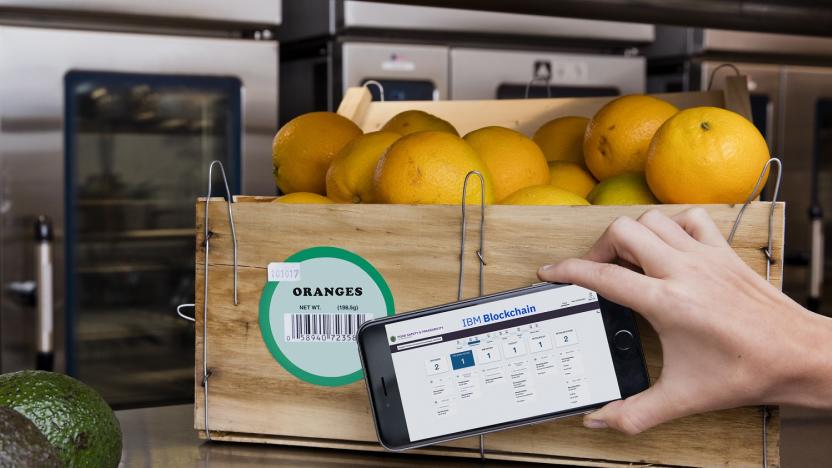unilever
Latest

Microsoft and 12 others join Amazon's climate change initiative
Unilever also pledged to hit net zero carbon emissions by 2040.

Suppliers and retailers will use blockchain to keep food fresh
IBM has joined with a group of food supply companies and retailers to use the computing company's blockchain tech to keep food fresh. Currently, it can take up to two weeks to track down the source of contaminated foodstuffs. But just like tracking cryptocurrency transactions all over the world, this consortium will harness IBM's enterprise blockchain services to give its members access to a constantly-updating ledger of food, from source to store.

Shoparoo promises a fun iPhone-alternative to box top school fundraising
If you're a parent like I am, you may be collecting box tops for your school. Box tops are great -- they help schools raise funds in a really effective way. For those who don't know, select merchandise in grocery stores contain a redemption value for school fundraising, usually a few pennies per item bought. Due to the labor of dealing with these box tops, they can also be a big pain. Someone has to collect them, bundle them, count them and track them. Now there's a new entry in the school fundraising arena. The free Shoparoo iOS app isn't intended to replace box tops. It offers another distinct avenue for parents to raise money for schools. Today, I had the pleasure of talking to Jared Schrieber, the Co-Founder and CEO of InfoScout, the company behind Shoparoo. "Box top fundraising is wonderful," he told me, "but it could be so much better." Shoparoo has partnered with Proctor & Gamble and Unilever, who produce brands like Dove, Suave, Ragu and Skippy, to raise money for schools. Consumers essentially donate their purchasing habits. You use the app to submit receipts from super-centers, groceries, clubs, pet stores, dollar stores, convenience stores and drug stores. The data is as anonymous as you want to make it. You can scratch off credit card numbers, names and even embarrassing purchases. None of the information is tracked directly to you. You snap a pic (within seven days of purchase) and your school benefits. What companies like P&G and Unilever get out of this is a way to evaluate purchasing habits by household. Seeing entire real-world receipts puts purchases into context. They get to see how families buy, both across retailers and across time. In return, your school earns about 2 cents per $10 purchase, up to 8 cents for purchases over $100. That doesn't sound like a lot, but (1) you don't have to actively buy anything specific, and (2) with enough parents participating, the money can grow over time. Plus, Shoparoo intends to offer "bonus purchase" items, so parents can earn more by picking preferred brands. InfoScout plans to cut its first set of checks each year on July 31st, delivering them to schools during the first few weeks of August. Leaderboards allow schools to track their most proficient donors, and social networking encourages parents to spread the word. See Shoparoo's Facebook page for more details. How can you get your school involved? Chances are good that Shoparoo already lists your school in its data base. Just submit an email address (it can be as throwaway as you like) and start shopping. Schrieber suggests that you contact your current box tops coordinator, your PTO/PTA and email your principal to get started. Many schools highlight the program on their websites and Facebook pages to support the effort. Even small amounts of money can make real differences in schools. Whether you're supporting a music program, providing field trip grants or donating to a winter coats program, schools know how to make parent fundraisers pennies count. Shoparoo promises to help earn those pennies.

Microsoft will roll out Kinect-enabled NUads on Xbox 360 this fall (video)
Microsoft's Xbox Live Advertising team first showed off its highly interactive NUads platform at the Cannes festival last year, and today announced they will start rolling out to Xbox 360s this fall. The first advertisers up are Toyota, Unilever and Samsung Mobile USA with Kinect-enabled ads that let viewers respond to questions after a 30-second spot by voice or gesture. According to Microsoft this is great because viewers can easily see real time stats of how others are voting and advertisers get immediate feedback. While we've all wanted to shout down an ad at some point (just look out the window Zooey, seriously) there's probably going to be a contingent that thinks letting advertisers accumulate data from behind that Kinect camera lens is a little creepier than they'd like. Check out Microsoft's pitch for the tech in press release and video form after the break.

EA: emerging ad trends in social games
Advertising is poised to take a bigger role in mobile gaming now that Electronic Arts has signed a multimillion dollar, year-long advertising campaign with Unilever, says a report in AllThingsD. Unilever is a multinational consumer goods company that owns such brands as Dove, Ben & Jerry's, Lipton and more. EA is using its popular Facebook game, The Sims Social, as a vector to introduce advertising for Unilever products like Dove. When players enter the bathroom, they will be able to shower with Dove shampoo. During the summer, their refrigerators can be stocked with Magnum Mini ice cream bars. These branded virtual goods are enticing to players because they are often offered for free. This advertising deal isn't limited to Facebook. It's a cross-platform agreement that could push branded virtual goods into The Sims line of games on iOS devices and consoles like the Xbox 360.

Brazilian laundry soap comes with a GPS surprise
The crackerjack marketing teams at Unilever Brazil have come up with a promotion for the ages -- they've implanted GPS tracking devices into fifty boxes of the popular Omo laundry soap, and plan to follow buyers all the way to their doorsteps. We're sure it's a harmless promotion -- the chosen get a free video camera -- but on paper it sounds hilariously bad. You see, the promotions agency (aptly named Bullet) may be knocking on doors in neighborhoods with high crime rates, where unwitting individuals may not open the door, but should that happen there's a backup plan -- they'll instruct the box to start beeping via remote. If the bomb scare doesn't smoke out prospective winners, we're not sure if Bullet will bash down the doors, but the disastrous recipe also includes plans to post the general vicinity where winners live (complete with photographs) at an experimental website. And you thought Walmart's new RFID tags were bad.

Share Happy vending machine dispenses ice cream for a smile (and your soul)
We thought the Let's Pizza machine was wild, but this next item is downright scary... and delicious! The brainchild of Unilever (the company that owns Ben & Jerry's, Good Humor, Breyers, Klondike, and Wall's), Share Happy is a $20,000 Sapient-built ice cream vending machine that takes your picture, using facial recognition to determine if you're smiling and Photo Booth-esque features (superimposing "funny hats, a mustache, glasses, bow tie, afro hair, things like that," on your mug) to coax you into smiling. And once it determines that you are smiling, it gives you a free ice cream treat -- but not before collecting valuable demographic information by analyzing the image for things like gender and approximate age and asking you to sign away your likeness for promotional use. The images are sent to Unilever HQ a few times an hour, using either Ethernet, WiFi, or 3G. Camera shy? Don't worry, you'll still be able to pay for your junk food the old fashioned way. Currently being tested in Singapore, Lisbon, and Paris, with a UK test planned "soonish." Check the thing out on video by hitting the source link.

Rivers Run Red with Linden Lab: A Second Life for the enterprise
Remember back in August where we predicted that a corporate/enterprise version of the Second Life grid was more or less inevitable? Well, that appears to have functionally come to pass, though the details are still hazy. Rivers Run Red has partnered up with Linden Lab to provide a product called Immersive Workspaces to (what appears to be primarily) the global enterprise corporate market. Immersive Workspaces is a fusion of Second Life grid technology along with a blend of Second Life objects, web-sites and web-services, all apparently very tightly integrated. As a part of the partnership, each company may either individually or jointly sell and market each other's products, and Linden Lab has an exclusive license to Rivers Run Red's Immersive Workspaces product. For its part, Rivers Run Red will provide "product and content development services to Linden Lab's clients and developer community". Right now, the only known customers of Immersive Workspaces appear to be Unilever and Diageo. Are you a part of the most widely-known collaborative virtual environment or keeping a close eye on it? Massively's Second Life coverage keeps you in the loop.

Emotion recognition software knows you want ice cream
Dutch researchers Theo Gevers and Nicu Sebe, known mostly for their work deciphering the Mona Lisa's smile, have created a face recognition system which can gauge a person's level of happiness. The scientists, working with the multinational goods-manufacturer Unilever, created a face-tracking algorithm which maps video of a subject's face into 3D regions, and then uses those regions to determine their level of pleasure. The tests followed European women's reactions to eating five different foods: vanilla ice cream, chocolate, cereal bars, yogurt and apples. Unsurprisingly, the scientists discovered that women enjoyed eating ice cream and chocolate far more than an apple or yogurt -- the latter even evoking "sad" expressions from 28% of test subjects. Unilever hopes to put the technology to work in creating products such as reduced-fat ice creams which elicit the same response as their full-fat counterparts, while the researchers will be launching a consumer version of the software sometime in August, as well as a website to analyze up to 1,000 user-provided photos daily.



